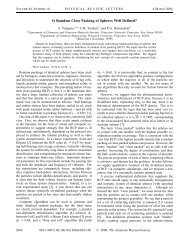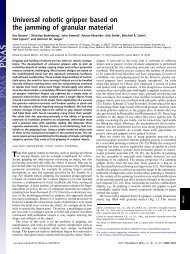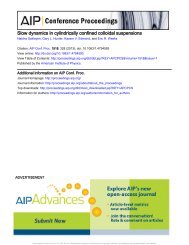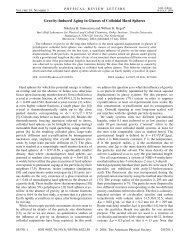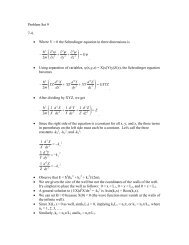Retrieval Practice Produces More Learning than Elaborative ...
Retrieval Practice Produces More Learning than Elaborative ...
Retrieval Practice Produces More Learning than Elaborative ...
You also want an ePaper? Increase the reach of your titles
YUMPU automatically turns print PDFs into web optimized ePapers that Google loves.
<strong>Retrieval</strong> <strong>Practice</strong> <strong>Produces</strong> <strong>More</strong> <strong>Learning</strong> <strong>than</strong> <strong>Elaborative</strong> Studying with ConceptMappingJeffrey D. Karpicke* and Janell R. BluntDepartment of Psychological Sciences, Purdue University, West Lafayette, IN 47907, USA.*To whom correspondence should be addressed. E-mail: karpicke@purdue.eduEducators rely heavily on learning activities thatencourage elaborative studying, while activities thatrequire students to practice retrieving and reconstructingknowledge are used less frequently. Here, we show thatpracticing retrieval produces greater gains in meaningfullearning <strong>than</strong> elaborative studying with concept mapping.The advantage of retrieval practice generalized acrosstexts identical to those commonly found in scienceeducation. The advantage of retrieval practice wasobserved with test questions that assessed comprehensionand required students to make inferences. The advantageof retrieval practice occurred even when the criterial testinvolved creating concept maps. Our findings support thetheory that retrieval practice enhances learning byretrieval-specific mechanisms rather <strong>than</strong> by elaborativestudy processes. <strong>Retrieval</strong> practice is an effective tool topromote conceptual learning about science.Most thought on human learning is guided by a few tacitassumptions. One assumption is that learning happensprimarily when people encode knowledge and experiences. Arelated assumption is that retrieval—the active, cue-drivenprocess of reconstructing knowledge—only measures theproducts of a prior learning experience but does not itselfproduce learning. Just as we assume that the act of measuringa physical object would not change the size, shape, or weightof the object, so too people often assume that the act ofmeasuring memory does not change memory (1, 2). Thusmost educational research and practice has focused onenhancing the processing that occurs when students encodeknowledge – that is, getting knowledge "in memory". Far lessattention has been paid to the potential importance of retrievalto the process of learning. Indeed, recent National ResearchCouncil books about how students learn in educationalsettings (3–5) contain no mention of retrieval processes.It is beyond question that activities that promote effectiveencoding, known as elaborative study tasks, are important forlearning (6). However, research in cognitive science haschallenged the assumption that retrieval is neutral anduninfluential in the learning process (7–11). Not only doesretrieval produce learning, but a retrieval event may actuallyrepresent a more powerful learning activity <strong>than</strong> an encodingevent. This research suggests a conceptualization of mind andlearning that is different from one in which encoding placesknowledge in memory and retrieval simply accesses thatstored knowledge. Because each act of retrieval changesmemory, the act of reconstructing knowledge must beconsidered essential to the process of learning.Most prior research on retrieval practice has beenconducted in the verbal learning tradition of memory research(12). The materials used have often not reflected the complexinformation students learn in actual educational settings (13).Most prior research has not used assessments thought tomeasure meaningful learning, which refers to students'abilities to make inferences and exhibit deep understanding ofconcepts (14, 15). But perhaps the greatest impediment tobroad application of retrieval practice is that we do not knowwhether retrieval activities are more effective <strong>than</strong> otheractive, elaborative learning activities. <strong>Retrieval</strong> practice mightproduce levels of learning that are essentially the same asthose produced by elaborative studying. Alternatively, if thereare retrieval-specific mechanisms that promote learning, thenretrieval practice may represent a way to promote studentlearning that goes beyond elaborative study activities used inSTEM education.The present experiments put retrieval practice to a test.<strong>Elaborative</strong> learning activities hold a central place incontemporary education. We examined the effectiveness ofretrieval practice relative to elaborative studying with conceptmapping (16–18). In concept mapping, students construct adiagram in which nodes are used to represent concepts andlinks connecting the nodes represent relations among theconcepts. Concept mapping is considered an active learningtask, and it serves as an elaborative study activity whenstudents construct concept maps in the presence of thematerials they are learning. Under these conditions, conceptmapping bears the defining characteristics of an elaborativestudy method: It requires students to enrich the material theyare studying and encode meaningful relationships amongconcepts within an organized knowledge structure.In two experiments, we compared the effectiveness ofretrieval practice and elaborative studying with conceptDownloaded from www.sciencemag.org on January 21, 2011/ www.sciencexpress.org / 20 January 2011 / Page 1 / 10.1126/science.1199327
mapping for producing meaningful learning of sciencematerials. Eighty undergraduate students participated inExperiment 1. The students first studied a science text underone of four conditions within a single initial learning session.In the study-once condition, students studied the text in asingle study period. In the repeated study condition, studentsstudied the text in four consecutive study periods (8). In theelaborative concept mapping condition, students studied thetext in an initial study period and then created a concept mapof the concepts in the text. The students were instructed aboutthe nature of concept mapping, viewed an example of aconcept map, and created their concept maps on paper whileviewing the text. This is a typical way concept mapping isused as an elaborative study activity (16–18). Finally, in theretrieval practice condition, students studied the text in aninitial study period and then practiced retrieval by recalling asmuch of the information as they could on a free recall test.After recalling once, the students restudied the text andrecalled again. The total amount of learning time was exactlymatched in the concept mapping and retrieval practiceconditions (19).At the end of the learning phase, we assessed students'metacognitive knowledge of the effectiveness of theselearning activities by having students make judgments oflearning. After completing the learning phase, studentspredicted the percentage of information from the text theywould remember in one week (20).The students then returned to the laboratory one week laterfor a final short-answer test. To assess meaningful learning,the test included both verbatim questions, which assessedconceptual knowledge stated directly in the text, andinference questions, which required students to connectmultiple concepts from the text. Both question types areconceptual, but verbatim and inference questions are thoughtto assess different depths of conceptual knowledge (14, 15).The proportion of ideas produced on the initial conceptmaps and recalled in the retrieval practice condition wasnearly identical [.78 and .81, respectively, F(1, 38) = 0.46,n.s.]. Therefore, the interpretation of any differences on thefinal test is not clouded by differences in initial learning timeor differences in the initial proportion of ideas correctlyproduced in the concept mapping and retrieval practiceconditions.On the final test one week later, the repeated study,elaborative concept mapping, and retrieval practiceconditions all outperformed the study-once condition on bothverbatim and inference questions (Fig. 1, A and B). <strong>Retrieval</strong>practice produced the best learning, better <strong>than</strong> elaborativestudying with concept mapping, which itself was notsignificantly better <strong>than</strong> spending additional time reading.Collapsed across question type (verbatim and inference), theadvantage of retrieval practice (M = .67) over elaborativestudying with concept mapping (M = .45) represented about a50% improvement in long-term retention scores [d = 1.50,F(1, 38) = 21.63, ! p 2 = .36].Students' judgments of learning, solicited in the initiallearning session, reflected little metacognitive knowledge ofthe benefits of retrieval practice (Fig. 1C). Students predictedthat repeated studying would produce the best long-termretention and that practicing retrieval would produce theworst retention, even though the opposite was true (7, 8).We carried out a second experiment to replicate the resultsof our first experiment and extend them in three ways. First,we sought to generalize our results to texts that representdifferent knowledge structures commonly found in scienceeducation, because under some circumstances theeffectiveness of different learning activities can depend on thestructure of the materials that students are learning (21). Weused texts with enumeration structures, which describe a listof concepts (e.g., a text describing properties of differentmuscle tissues), and texts with sequence structures, whichdescribe a continuous and ordered series of events (e.g., a textdescribing the sequence of events involved in the process ofdigestion) (22).Second, to determine the robustness of our retrievalpractice effects, we examined the relative effectiveness ofretrieval practice and elaborative concept mapping for eachindividual learner. We tested a total of 120 students and useda within-subject design. Each student created a concept mapof one science text and practiced retrieval of a second text.This experimental design allowed us to determine how manystudents showed an advantage of retrieval practice overconcept mapping, how many showed the opposite result, andhow many showed no difference between learning activities.Third, we assessed long-term learning with two differentfinal test formats. In Experiment 1, retrieval practiceproduced better performance <strong>than</strong> elaborative studying withconcept mapping on a final short-answer test. It may be thatthe similarity of initial learning and final testing scenarioswas important and that the final short-answer test was moresimilar to the initial retrieval practice task <strong>than</strong> to the initialconcept mapping task. Therefore, in Experiment 2, half of thestudents took a final short-answer test, like the one used inExperiment 1, and half took a final test in which they createdconcept maps of the two texts, without viewing the texts onthe final test. If retrieval practice helps students build theconceptual knowledge structures they need to retainknowledge over the long-term, then it should produce betterperformance <strong>than</strong> elaborative studying with concept mappingeven when the final test involves creating a concept map.Initial learning time was again exactly matched in theelaborative concept mapping and retrieval practiceconditions. However, in Experiment 2, students produced agreater proportion of ideas on the initial concept maps <strong>than</strong>Downloaded from www.sciencemag.org on January 21, 2011/ www.sciencexpress.org / 20 January 2011 / Page 2 / 10.1126/science.1199327
they did in on the initial tests in the retrieval practicecondition [.74 versus .65, respectively, F(1, 117) = 23.13, ! p2= .17]. Therefore, the initial level of performance favored theconcept mapping condition.The results on the final short-answer test were similar forverbatim and inference questions (Fig. 2), as was the case inExperiment 1. Therefore, the results were collapsed acrossquestion type. <strong>Retrieval</strong> practice produced better performance<strong>than</strong> elaborative concept mapping for both types of sciencetext (Fig. 2, A and B). Collapsed across the two text formats,the advantage of retrieval practice was again large [d = 1.07,F(1, 59) = 68.54, ! p 2 = .54].Fig. 2, C and D, shows performance on the final conceptmapping test. If the nominal similarity of initial learning andfinal test conditions were important, one might expect initialelaborative study with concept mapping to produce the bestperformance when the final test also involved creatingconcept maps. That was not the case. Even when the final testinvolved using memory to construct a concept map,practicing retrieval during original learning produced betterperformance <strong>than</strong> engaging in elaborative study by creatingconcept maps during original learning [d = 1.01, F(1, 59) =58.42, ! p 2 = .50].We again examined whether students exhibitedmetacognitive knowledge of the benefits of retrieval practice.Students' judgments of learning were solicited after studentshad experienced each text in the initial learning phase. Ingeneral, students erroneously predicted that elaborativeconcept mapping would produce better long-term learning<strong>than</strong> retrieval practice (Fig. 2, E to H).Finally, we examined the relative effectiveness of retrievalpractice and elaborative study with concept mapping forevery individual learner in the experiment. Table 1 shows thenumber of subjects who performed better following retrievalpractice <strong>than</strong> concept mapping, the number who showed theopposite result, and the number who performed equivalentlyin both conditions. Overall, 101 out of 120 students (84%)performed better on the final test after practicing retrieval<strong>than</strong> after elaborative studying with concept mapping. Table 1also shows students' judgments of learning. Ninety out of 120students (75%) believed that elaborative concept mappingwould be just as effective or even more effective <strong>than</strong>practicing retrieval. Most students did not expect thatretrieval practice would be more effective <strong>than</strong> elaborativeconcept mapping, but indeed it was.<strong>Retrieval</strong> practice is a powerful way to promotemeaningful learning of complex concepts commonly found inscience education. Here we have shown that retrieval practiceproduces more learning <strong>than</strong> elaborative studying, and weused concept mapping as a means of inducing elaborationwhile students studied. We hasten to add that conceptmapping itself is not inherently just an elaborative study task.When students create concept maps in the presence ofmaterials they are learning, the activity involves elaborativestudying. Students could also create concept maps in theabsence of materials they are learning, and then the activitywould involve practicing retrieval of knowledge.Nevertheless, both elaborative concept mapping and retrievalpractice are active learning tasks, and our results make it clearthat whether a task is considered "active" is not diagnostic ofhow much learning the task will produce. The specific natureof the activity determines the degree and quality of learning,so understanding the nature of encoding and retrievalprocesses is crucial for designing educational activities.There are several theoretical reasons to expect that theprocesses involved in retrieving knowledge differfundamentally from the processes involved in elaborativestudying. During elaboration, subjects attain detailedrepresentations of encoded knowledge by enriching orincreasing the number of encoded features. But duringretrieval, subjects use retrieval cues to reconstruct whathappened in a particular place at a particular time. In freerecall, subjects must establish an organizational retrievalstructure (23) and then discriminate and recover individualconcepts within that structure (24). <strong>Retrieval</strong> practice likelyenhances the diagnostic value of retrieval cues, which refersto how well a cue specifies a particular piece of knowledge tothe exclusion of other potential candidates (25–27). Rather<strong>than</strong> multiplying or increasing the number of encodedfeatures, which occurs during elaboration, retrieval practicemay improve cue diagnosticity by restricting the set ofcandidates specified by a cue to be included in the search set(23, 25–27). Thus mechanisms involved in retrievingknowledge play a role in producing learning.Research on retrieval practice suggests a view of how thehuman mind works that differs from everyday intuitions.<strong>Retrieval</strong> is not merely a read out of the knowledge stored inone's mind – the act of reconstructing knowledge itselfenhances learning. This dynamic perspective on the humanmind can pave the way for the design of new educationalactivities based on consideration of retrieval processes.References and Notes1. R. A. Bjork, in Information Processing and Cognition: TheLoyola Symposium, R. L. Solso, Ed. (Erlbaum, Hillsdale,NJ, 1975), pp. 123–144.2. J. D. Karpicke, H. L. Roediger, J. Mem. Lang. 57, 151(2007).3. J. D. Bransford, A. L. Brown, R. R. Cocking, Eds., HowPeople Learn: Brain, Mind, Experience, and School(National Research Council, Washington, DC, 2000).4. M. S. Donovan, J. D. Bransford, Eds., How StudentsLearn: Science in the Classroom (National ResearchCouncil, Washington, DC, 2005).Downloaded from www.sciencemag.org on January 21, 2011/ www.sciencexpress.org / 20 January 2011 / Page 3 / 10.1126/science.1199327
5. R. A. Duschl, H. A. Schweingruber, A. W. Shouse, Eds.,Taking Science to School: <strong>Learning</strong> and Teaching Sciencein Grades K-8 (National Research Council, Washington,DC, 2005).6. F. I. M. Craik, E. Tulving, J. Exp. Psy. Gen. 104, 268(1975).7. J. D. Karpicke, H. L. Roediger, Science 319, 966 (2008).8. H. L. Roediger, J. D. Karpicke, Psychol. Sci. 17, 249(2006).9. S. K. Carpenter, H. Pashler, Psychon. Bull. Rev. 14, 474(2007).10. H. Pashler, D. Rohrer, N. J. Cepeda, S. K. Carpenter,Psychon. Bull. Rev. 14, 187 (2007).11. M. A. Pyc, K. A. Rawson, J. Mem. Lang. 60, 437 (2009).12. For a review see H. L. Roediger, J. D. Karpicke,Perspectives Psychol. Sci. 1, 181 (2006).13. But see J. D. Karpicke, H. L. Roediger, Mem. Cog. 38,116 (2010); M. A. McDaniel, D. C. Howard, G. O.Einstein, Psychol. Sci. 20, 516 (2009).14. L. W. Anderson, D. R. Krathwohl, P. W. Airasian, K. A.Cruikshank, R. E. Mayer, P. R. Pintrich et al., A Taxonomyfor <strong>Learning</strong>, Teaching, and Assessing: A Revision ofBloom’s Taxonomy of Educational Objectives (Longman,New York, 2000).15. R. E. Mayer, <strong>Learning</strong> and Instruction (Prentice Hall,Upper Saddle River, NJ, 2008).16. J. D. Novak, D. B. Gowin, <strong>Learning</strong> How to Learn(Cambridge Univ. Press, NY, 1984).17. J. D. Novak, Res. Sci. Ed. 35, 23 (2005).18. J. C. Nesbit, O. O. Adesope, Rev. Ed. Res. 76, 413 (2006).19. Materials, methods, and additional results are available assupporting material on Science Online.20. J. Dunlosky, J. Metcalfe, Metacognition (Sage, ThousandOaks, CA, 2009).21. M. A. McDaniel, G. O. Einstein, Ed. Psy. Rev. 1, 113(1989).22. L. K. Cook, R. E. Mayer, J. Ed. Psy. 80, 448 (1988).23. J. G. W. Raaijmakers, R. M. Shiffrin, Psy. Rev. 88, 93(1981).24. R. R. Hunt, M. A. McDaniel, J. Mem. Lang. 32, 421(1993).25. J. S. Nairne, Mem. 10, 389 (2002).26. J. S. Nairne, in Distinctiveness and Memory, R. R. Hunt,J. Worthen, Eds. (Oxford Univ. Press, NY, 2006), pp. 27–46.27. J. D. Karpicke, F. M. Zaromb, J. Mem. Lang. 62, 227(2010).28. This research was supported by a grant from the NationalScience Foundation (#0941170). We <strong>than</strong>k Claire Ballas,Beth Byrer, Hannah Cannon, and Brittany Etchison forhelp with this research.Supporting Online Materialwww.sciencemag.org/cgi/content/full/science.1199327/DC1Materials and MethodsFig. S1Table S1References20 October 2010; accepted 10 January 2011Published online 20 January 2011; 10.1126/science.1199327Fig. 1. Results of Experiment 1. (A and B) show theproportions correct on verbatim and inference short-answerquestions, respectively. (C) shows the proportion ofinformation subjects predicted they would recall on the finaltest (their metacognitive judgments of learning). Error barsindicate SEMs. On the final short answer test, retrievalpractice enhanced long-term learning above and beyondelaborative study with concept mapping by one and a halfstandard deviations (d = 1.50), yet students were largelyunable to predict this benefit.Fig. 2. Results of Experiment 2. (A and B) show theproportions correct on the final short-answer tests forenumeration and sequence texts, respectively. (C and D)show the proportions correct on the final concept mappingtests for enumeration and sequence texts, respectively. Errorbars indicate SEMs. <strong>Retrieval</strong> practice enhanced long-termlearning above and beyond elaborative concept mapping bymore <strong>than</strong> one standard deviation on both types of final test(ds = 1.07 and 1.01, respectively). (E to H) show theproportion of information subjects predicted they wouldrecall on the final test in each initial learning condition.Students tended to believe that elaborative concept mappingwould produce the same or even greater learning <strong>than</strong>retrieval practice, even though the opposite was true, asshown in (A) to (D).Downloaded from www.sciencemag.org on January 21, 2011/ www.sciencexpress.org / 20 January 2011 / Page 4 / 10.1126/science.1199327
Table 1. Number of subjects showing different patterns of actual performance and metacognitive judgments in Experiment 2.<strong>Retrieval</strong>: the retrieval practice condition. Mapping: the elaborative concept mapping condition. Final SA Test: the final shortanswer test condition. Final Map Test: the final concept mapping test condition. Total: the sums across the two final testconditions.Actual Performance<strong>Retrieval</strong> > Mapping <strong>Retrieval</strong> = Mapping <strong>Retrieval</strong> < MappingFinal SA Test 52 3 5Final Map Test 49 3 8Total 101 6 13Metacognitive Predictions<strong>Retrieval</strong> > Mapping <strong>Retrieval</strong> = Mapping <strong>Retrieval</strong> < MappingFinal SA Test 12 14 34Final Map Test 18 17 25Total 30 31 59Downloaded from www.sciencemag.org on January 21, 2011/ www.sciencexpress.org / 20 January 2011 / Page 5 / 10.1126/science.1199327


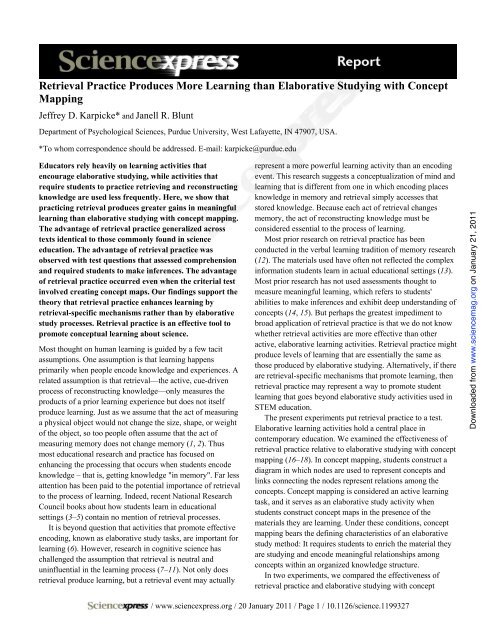
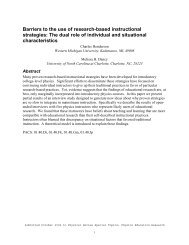
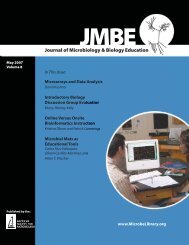
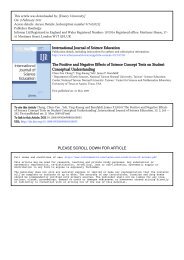
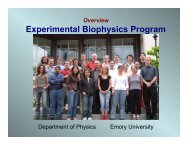
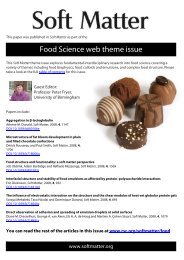

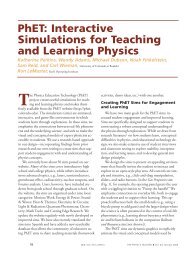
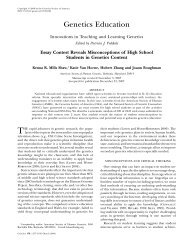
![view the Dish Show [PDF] - Department of Physics - Emory University](https://img.yumpu.com/45032745/1/190x146/view-the-dish-show-pdf-department-of-physics-emory-university.jpg?quality=85)
